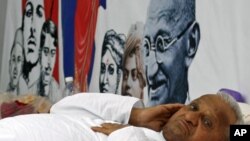An activist on a hunger strike in India is gaining widespread public support in his efforts to pressure the government on the issue of corruption. The movement draws on some of modern India's most deeply cherished nonviolent traditions.
Hundreds of supporters Wednesday voiced their solidarity with the 72-year-old activist known as Anna Hazare.
The social campaigner is seen by many Indians as having strong ethical credentials. He is demanding the government form a joint committee as a first step toward enacting tough new anti-corruption legislation. The committee, and the proposed bill, would dramatically reduce the role of politicians in anti-corruption efforts, while giving ordinary citizens and members of civic groups a much stronger hand in naming and prosecuting corrupt leaders.
Hazare began his hunger strike Tuesday. He said he will starve himself to death, if needed, to achieve his aim. At least 150 people have made the same pledge here in Delhi alone. Sympathy hunger strikes and gatherings have emerged in a number of other major cities nationwide. Hazare told supporters they are part of something big.
He said after the huge struggle for freedom that India waged against the British, nothing changed. Corruption and looting did not end, it's just that the whites left and the locals took over.
Hazare described it as the second struggle for freedom by the Indian people. He said the freedom they attain this time will deliver justice to the poor. Today it is so difficult for the poor to subsist, he said.
Hazare's movement is fueled by deep Indian frustration with the government, headed by Prime Minister Manmohan Singh, and its perceived failure to rein in brazen episodes of graft by senior officials. A telecommunications scandal that deprived the public treasury of about $35 billion is the most often cited object of anger, in a country where hundreds of millions of people live on less than a dollar a day.
Sanjeev Chibber, a cancer doctor, says he is giving up the "prime of his surgical life" to devote himself full time to Hazare's movement. "India, the country, is rotten to the core - because of the cabal of people who have been running it for the last 63 years. The time has come for us -especially the middle classes - to take a lead and change the system."
Like Hazare, Chibber has fasted for two days, and says he is ready to continue. "I am ready to die, if I can do something for my country. And if you die not only for your country, you die for the common man who's suffering, I think whatever sins I have done in my life - as a Hindu I'm speaking now - they'll be washed away."
Senior Indian officials say they are deeply concerned about corruption, and are eager to listen to Hazare's ideas. However, they criticize Hazare for demanding change too quickly, without giving the parliamentary process enough time to run its course.
In an open letter to the prime minister, Hazare wrote Wednesday that India has waited 62 years for "independent and effective" anti-corruption systems. The letter complains that Singh ignored his correspondence for months.
Rishikesh, a lawyer who helped organize Wednesday's rally, said Indians now are coming together in a way that transcends politics and religion.
"This is not organized by any political party. This is not organized by any association. This is a people movement. "
Hazare's movement has its own Facebook page online, and the micromessaging platform Twitter was flooded with posts of support for his cause Wednesday. Some supporters said Hazare may be starting a revolution, with parallels to the ones that have been taking place in the Middle East.
Rishikesh said unlike Libyans and Egyptians, Indians are not seeking to remove a tyrant, and that they still have fundamental faith in their democratic framework. He warns, though, that the movement will greatly intensify if the government does not take action.
"This can become another Tahrir Square. And nobody can stop it."
Hazare's hunger strike is continuing around the clock in downtown Delhi.
Activist's Hunger Strike Gains Support in India
- By Kurt Achin




